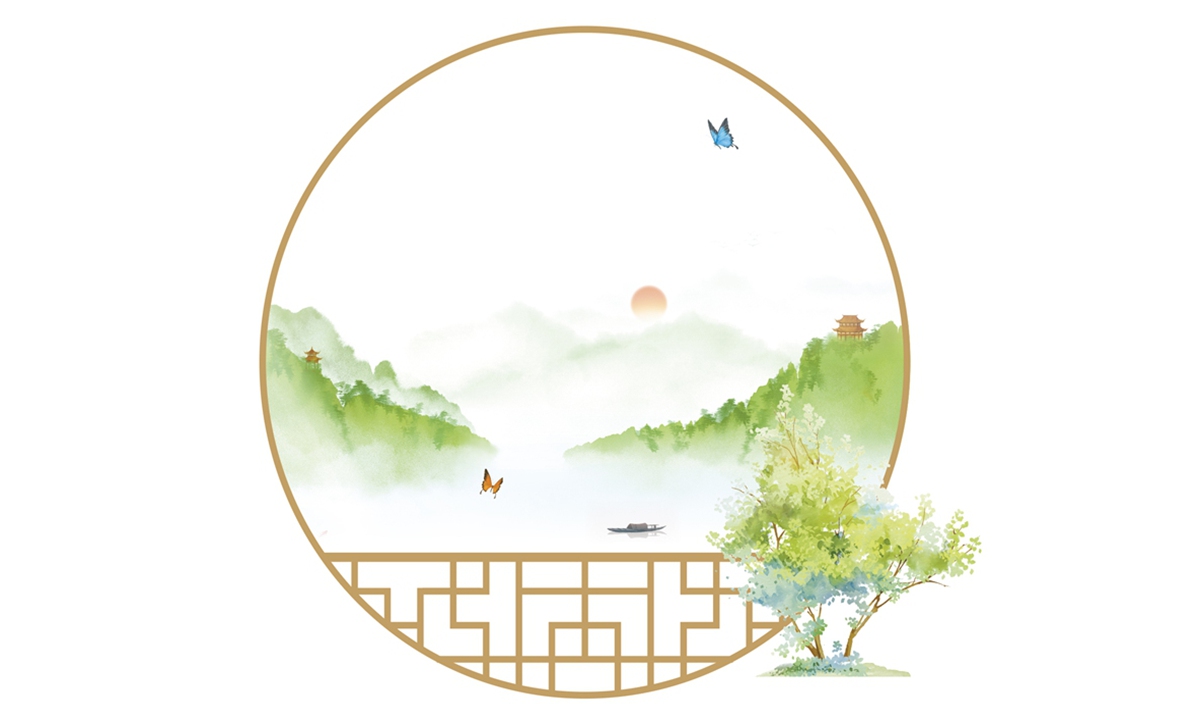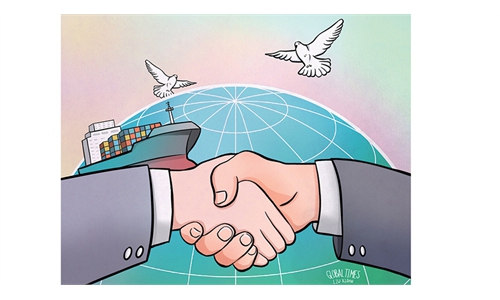
Photo: VCG
Editor's Note:
The concept of "Hehe" in Chinese culture, with the first "He" embodying harmony, peace and balance and the second representing convergence, unity and cooperation, is central to both the individual and collective mind-set in China. Rooted in thousands of years of philosophy, the idea of "Hehe" serves as a guiding principle for living in harmony with others, nature and oneself. In a broader context, the concept of "Hehe" has significant relevance to the world today, as addressing the global challenges we face in various areas requires the principles that "Hehe" emphasizes. Viewed through a contemporary lens, "Hehe" is a timeless and universal concept that can guide China and the world toward a more harmonious, peaceful and balanced future. The Global Times gathers opinions from experts and scholars around the world to explore the global significance of "Hehe" culture from various perspectives. This is the sixth piece of the series.
I remember that in the first few years I was living in China, I had a conversation with Western colleagues, mostly Anglo-Americans, about how to achieve peaceful harmony in regions with ongoing conflicts.
Their stance was that democracy had to be spread "whatever it takes," and, if necessary, force-fed down the throats of the region's leadership, regardless of international law. They believed this was the only solution to achieve peaceful harmony in the area.
In contrast, my stance was that any sovereign country should be respected as such. They chalked up this difference of opinion to my "being French," thus revealing that it was not only developing countries that they looked down upon, but also other white Europeans who did not share their views. This was my first understanding of the difference between people who seek harmony through respect, understanding and temperance, and those whose definition of "peaceful harmony" is the violent erasure of all diverging opinions.
About 25 years later, this personal anecdote still resonates on the macro level: The current strategic competition initiated by the US against China reveals a fundamental difference in the two countries' visions of the world. On one hand, the Pax Americana has been achieved through coercive and invasive means - reaching "harmony" through domination, including cultural soft power, financial coercion, and, when all else fails, military subjugation.
On the other side of the spectrum, China has gradually introduced its own relationship with the world, a model based on the principle and concept of "harmonious coexistence."
The emphasis on "harmonious coexistence" is rooted in China's Hehe culture. The term "Hehe" consists of two Chinese characters that have the same pronunciation but different meanings: The first can be generalized as "harmony," and the second "convergence." In short, Hehe culture involves seeking common ground while reserving differences, promoting harmonious coexistence and coordinated development.
The Confucian concept of "the Middle Way" also embodies some of the core values emphasized by Hehe culture. As one of the central concepts of Confucianism, the Middle Way advocates for an attitude in harmony with nature: seeking balance, minimizing excesses, easing contradictions and ensuring that decisions result from an optimal choice between action and passion. American political commentator Ezra Pound, who was also a translator of Confucius, called it the "unwobbling pivot." The European equivalent of this "unwobbling pivot" is the Aristotelian "Golden Mean." While it may have been forgotten in Western Europe and North America, this Middle Way is still practiced in China.
If the essence of the Middle Way lies in moderation and balance in behavior, then Hehe culture extends this balance to a broader scope, encompassing interpersonal relationships and coordination between nations. It emphasizes harmonious coexistence among people, and between humans and nature. President Xi Jinping in recent years has frequently mentioned the idea of "Hehe" on various diplomatic platforms, reiterating the importance of "promoting global solidarity" and emphasizing China's firm determination to build a community with a shared future for mankind. This vision integrates Marxism's mission of advancing human progress with the virtues of harmony and unity embodied in fine traditional Chinese culture, enriching and expanding China's philosophy of Hehe culture.
Contrary to the satirical predictions of Western media and commentators, China has no plans for world domination. Such ambitions would contradict the principles demonstrated by its 5,000-year-old civilization, which has shown that different cultures can coexist in harmony without seeking uniformity.
China has quite naturally opted for a more moderate approach: Instead of trying to position itself as a new and unique superpower, it has worked to open China to the world while promoting multipolarity, which will enable the country to diversify its development opportunities.
This positioning has allowed China to cultivate many friendships in the Global South, where Beijing is viewed as a reliable and powerful alternative to an increasingly erratic Western foreign policy. While the Hehe culture resonates strongly within the Global South, it's often too much for the Anglo-American Deep State players and their vassal states in Europe and Asia to handle. In 150 years of colonial wars and conquest, it never occurred to them that laying out a plan for common prosperity could be a win-win proposition. The Anglo-American hegemon only knows how to play zero-sum games, and when confronted with China's harmonious relationships with other states, its natural reaction is to suspect that these relationships are a ruse to achieve similar hegemonic ambitions. Western leaders are stuck in a mind-set that prevents them from imagining that the rest of the world has aspirations beyond merely taking sides.
China does not get involved in other countries' internal affairs; it doesn't even comment on the elections in the US or Japan. However, it does not shy away from delivering its opinion on situations such as the "historical injustice" faced by the Palestinian people. China also resists pressure from NATO and European states to parrot the West's official narrative on the Russia-Ukraine conflict. Moreover, it puts its diplomatic clout on the line to broker deals between countries that were portrayed as irreconcilable enemies by the West, such as the resumption of diplomatic relations between Saudi Arabia and Iran. This level of diplomatic success is possible because of China's value of Hehe culture, which translates into finding solutions in a harmonious way that is acceptable to all parties based on respecting diversity and embracing differences. There is no political or moral grandstanding, no promotion of a particular set of values, no condescendence toward other countries - only values of humanity, justice, mutual learning, dialogue and inclusiveness.
It will take more years for the Anglo-American hegemon to finally come to terms with its declining power and the loss of its self-perceived moral superiority. This period will be filled with provocations, clashes and false flag proxy attacks on China by an increasingly insecure hegemon. It will require remarkable diplomatic skills and self-restraint from China to avoid falling into the many traps set by the hegemon and its vassal states and minions. However, the sheer size of the Global South - comprising 85 percent of the world population and soon 50 percent of global GDP - along with the involvement of responsible, harmony-seeking Chinese leadership, should lead to a balance of power with the West.
As the world faces accelerating changes unseen in a century, human society stands once again at a crossroads in history. Only by drawing wisdom from ancient civilizations and maintaining a far-sighted vision can the world avoid losing its way amid transformations. At this critical juncture, it is more important than ever for humanity to uphold the idea of Hehe culture, and allow the beacon of civilization to illuminate the right path forward.
The author is a former diplomat, advertising executive and entrepreneur who has worked 25 years in China. He is the author of Understanding the relation between China and the West. Follow him on X @LH_86_. opinion@globaltimes.com.cn



